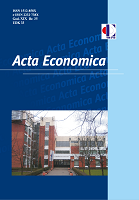STOCHASTIC MODELING OF OPTIMAL LOGISTICS IN THE FUNCTION OF MAXIMIZING INTERNATIONAL BUSINESS EFFICIENCY OF SMEs
STOCHASTIC MODELING OF OPTIMAL LOGISTICS IN THE FUNCTION OF MAXIMIZING INTERNATIONAL BUSINESS EFFICIENCY OF SMEs
Author(s): Mirjana Landika, Vanja Sredojević, Vedran Šupuković, Velibor PeulićSubject(s): Business Economy / Management, Transport / Logistics
Published by: Економски факултет Универзитета у Бањој Луци
Keywords: efficient operation; optimal management; model forecasting; realistic metrics; international;
Summary/Abstract: The concept of business activity conditions specific procedures and activities in order to maximize the difference between output and input variables while taking into account the uncertainty of the business outcome. The business outcome is determined by a number of factors that are under the control of the decision maker. However, a number of factors are conditioned by stochastic quantities, which obey the laws of probability of a random variable whose value the decision maker cannot influence but must anticipate and respect in the business decision making process. Conditionality of business results with the market component refers to user expectations, and it requires a model approach by which the uncertain business future is recomposed into business expectations, with a high level of reliability. Modeling of the system by the process of mathematical simulation enables the calculation of variants of business future in the present time without realizing business strategies before their selection and classification. The modeling process includes business system analysis, factor selection, qualitative and quantitative expression, classification of variables, functional linking, formulation of probability distribution of random variables, and the choice of time frame for simulation. The process of mathematical simulation indicates the management consequences of business alternatives, thus the decision maker is guided by business expectations and recruits business logistics in accordance with the decision. The simulation model is adapted to the specific management problem, specific conditions and circumstances of decisionmaking. It does not have a universal character and must be constructed specifically for each management situation.
Journal: Acta Economica
- Issue Year: 19/2021
- Issue No: 35
- Page Range: 9-18
- Page Count: 10
- Language: English

